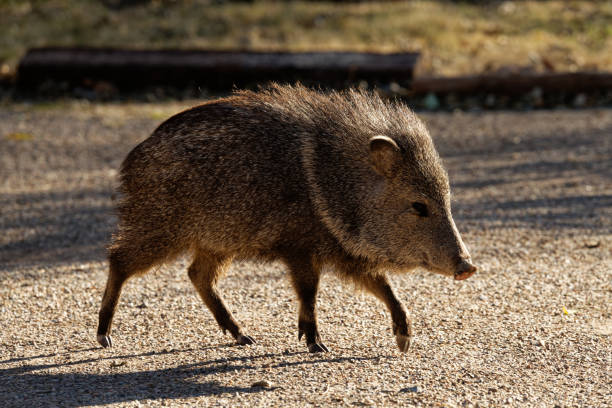ANIMAL: Collared Peccary/Javelina Dicotyles tajacu Type of Animal: Peccary Habitat: Desert, semidesert, grassland, subtropical/tropical woodland, forest, suburban areas, agricultural land, savanna, shrubland, rocky canyons, desert/semidesert washes, oak/oak-juniper woodland, arid/semiarid brush, rolling desert hills, chaparral, cities, caves, arid scrubland, found from sea level to altitudes as high as 9,842.52 ft Location(s): Ranges from SW US as far E as S Texas all the way down to Argentina. Also found in Trinidad & Tobago. Appearance: Pig-like mammal w/ grizzled gray & brown coarse coat, white collar around neck, pig-like snout, short bristly tail Food/Diet: Cacti, agave, succulents, mesquite beans, nuts, acorns, berries, roots, tubers, gourds, bulbs, herbs, fruit, flowers, forbs, shrubs, grasses, seeds, woody plants, cultivated crops, rhizomes, leaves, vines, insects, insect larvae, grubs, worms, eggs, lizards, rodents, carrion, refuse, amphibians, snakes, fish, fungi, baby tortoises/turtles, baby crocodilians Status in Wild: Stable Conservation: Breeding in zoos & wildlife parks. Reintroduction to Uruguay, Trinidad, & Tobago-where they’re rare. Lifestyle: Groups range from 2-50 individuals Additional Info: Called: Male: Boar Female: Sow Young: Piglet/Red Group: Herd/Squadron/Sounder Weight: Male: 35-68 lbs Female: 31-60 lbs Young: 6.4 lbs Gestation: 5 months Life Span: 8-10 years in wild, up to 24 years in captivity Height: Male: 1.5-2 ft Female: 1-1.5 ft Body Length: 2.6-3.5 ft, same for both sexes Tail Length: 0.5-4 in, same for both sexes Main predators are jaguars, pumas, wolves, coyotes, dogs, bobcats, crocodilians, ocelots, anacondas, & bears. Despite looking similar, peccaries are not pigs & are part of their own family. Only distantly related to pigs. Communicate using strong musky smell due to having poor eyesight. Have excellent sense of smell/hearing. Females give birth to 1-3 piglets/reds at a time. Called reds due to reddish-brown color when born. Unlike pigs, they have 3-chambered stomach. Fun Fact(s): These animals can be highly dangerous if threatened, cornered, or protecting young. Javelina name derives from Spanish word for javelin referring to sharp straight canine tusks. Also called Musk Hogs & Skunk Pigs due to musky smell.
